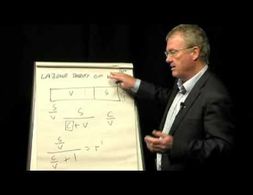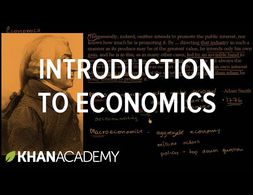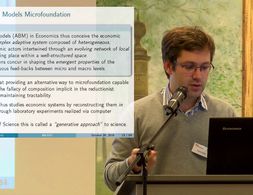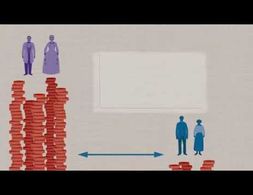✕
354 results
A concise introduction to Marx's Labour Theory of Value, the three ratios and the falling rate of profit hypothesis.
This essay focuses on the sources of government revenue within the Middle East and North African (MENA) region and proposes the implementation of a regional tax reset through increased taxation and tax reforms, deregulation in the private sector and economic diversification to reduce macroeconomic volatilities caused by the hydrocarbon industry.
This course offered by the International Monetary Fund (IMF) on edX provides an introduction in the major econometric tools used in standard Macroeconomics.
This short video by the Khan Academy presents a classic introduction to economic teaching. Starting with the quote by Adam Smith in "The Wealth of Nations" on the invisible hand, it shows how economics deals with the question of the allocation of scarce resources and shortly presents different questions addressed by microeconomics and macroeconomics. It further makes reference to questions of simplification in mathematical models.
Antoine Godin gives a bright, illustrated, introduction to agent-based, stock-flow-consistent modeling, with a clear focus on the agent-based aspect.
This teaching pack focuses on the practice and real-world activities of central banks. It assumes students have a grasp of basic macroeconomic concepts already, and is therefore most suitable to be used at the end of introductory macro courses, or in more advanced macro or monetary economics courses.
MERCOSUR (Mercado Común del Sur or Common Southern Market) was the first formalized attempt to integrate South American countries economically and politically.
What are the implications of the politics of "behavioural change"? Alexander Feldmann took a closer look for you on nudging and framing and if this is a legitimate instrument being used by the state to make us behave better in terms of our carbon footprint.
An essay of the writing workshop on contemporary issues in the field of Nigerian economics: Labour and all the dynamics, such as laws, mobility, gender participation, regulation etc., that are associated with it cements the need for this paper which seeks to objectively review, analyse, and if deemed necessary, give plausible recommendations.
Modern Monetary Theory (MMT) is a school of monetary and macroeconomic thought that focuses on the analysis of the monetary and credit system, and in particular on the question of credit creation by the state.
The workshop introduces into the field of critical political economy and tries to identify the role of finacial markets in capitalism, the reason for financial crises and the relevance of Marx in regard to these topics.
A historical glimpse of how economists of the 19th century debated the usefulness of mathematics to economics
If there’s one method economists have neglected the most, it’s qualitative research. Whereas economists favour mathematical models and statistics, qualitative research seeks to understand the world through intensive investigation of particular circumstances, which usually entails interviewing people directly about their experiences. While this may sound simple to quantitative types the style, purpose, context, and interpretation of an interview can vary widely. Because of this variety, I have written a longer post than usual on this topic rather than doing it a disservice. Having said that, examples of qualitative research in economics are sadly scant enough that it doesn’t warrant multiple posts. In this post I will introduce qualitative research in general with nods to several applications including the study of firm behaviour, race, Austrian economics, and health economics. More than usual I will utilise block quotes, which I feel is in the spirit of the topic.
Feminist economics critically analyzes both economic theory and economic life through the lens of gender, and advocates various forms of feminist economic transformation. In this course, we will explore this exciting and self-consciously political and transformative field.
This course provides an introduction to the ILO’s Tripartite Declaration of Principles concerning Multinational Enterprises and Social Policy (MNE Declaration). The course uses real cases related to labour and employment issues as examples of how the MNE Declaration is used in practice or as guidance.
From the two premises that (1) economies are complex systems and (2) the accumulation of knowledge about reality is desirable, I derive the conclusion that pluralism with regard to economic research programs is a more viable position to hold than monism. To substantiate this claim an epistemological framework of how scholars study their objects of inquiry and relate their models to reality is discussed. Furthermore, it is argued that given the current institutions of our scientific system, economics self-organizes towards a state of scientific unity. Since such a state is epistemologically inferior to a state of plurality, critical intervention is desirable.
This course introduces students to the relevance of gender relations in economics as a discipline and in economic processes and outcomes. The course covers three main components of gender in economics and the economy: (1) the gendered nature of the construction and reproduction of economic theory and thought; (2) the relevance and role of gender in economic decision-making; and (3) differences in economic outcomes based on gender. We will touch on the relevance of gender and gender relations in at least each of the following topics: economic theory; the history of economic thought; human capital accumulation; labor market discrimination; macroeconomic policy, including gender budgeting; household economics; basic econometrics; economic history; and economic crises.
The last 15 years have seen extensive research into ecosystem service valuation (ESV), spurred by the Millenium Ecosystem Assessment in 2005 (Baveye, Baveye & Gowdy, 2016). Ecosystem services are defined as “the benefits people obtain from ecosystems” (Millenium Ecosystem Assessment, p.V). For example, ecosystems provide the service of sequestering carbon which helps regulate the climate. Valuation means giving ecosystems or their services a monetary price, for example researchers have estimated that the carbon sequestration services of the Mediterranean Sea is between 100 and 1500 million euros per year. The idea of ESV was a response to the overuse of natural resources and degradation of ecosystems, allegedly due to their undervaluation and exclusion from the monetary economy. ESV can be used (1) for policy decision-making, for example allocating funding to a reforestation project (2) for setting payments to people who increase ecosystem services, for example a farmer increasing the organic carbon content of their soil, and (3) for determining fees for people who degrade ecosystem services, for example a company that causes deforestation.
Education policy seeks to ensure equality in access, equality within the classroom and in teaching- learning processes, and equality in outcomes. This course encourages students to assess and evaluate the extent to which these objectives are met in practice and the ways in which educational outcomes are shaped by, as well as alter, gendered social norms.
‘We cannot afford their peace & We cannot bear their wars’:
Value, Exploitation, Profitability Crises & ‘Rectification’
"his course introduces the complex, but critical, concepts of sustainability and resilience and examines your impact on our environment."
Complexity economics focuses on interactions and interdependencies between individuals and structures in economic systems. Those are systems of organised complexity. High importance is given to the analysis of networks.
In this overview paper, Laura Porak reviews the history of industrial policy in the European Union before the background of a Cultural Political Economy approach.
This article outlines the fundamental challenges of democratically planned economies and categorises proposed models into six groups, each of which approaches planning and coordination at different levels of authority and between myriad economic units in a particular way, taking into account efficiency as well as democratic principles and environmental and social sustainability. Through a classification system based on decision-making authority and mediation mechanisms, the article provides a framework for understanding and comparing these models. By examining their different approaches, it offers insights into the complexities and potential paths of democratically planned economies in the 21st century.
This book introduces 40 critical pointers for those who wish to see the theory in a broader, more realistic context. The material is suitable for introductory and intermediate courses and can be included selectively by students for additional reading or in lectures or tutorials as discussion points. "Students of mainstream economics need a guide like this to help them understand the underlying assumptions, limitations and inbuilt biases of what they are studying. It helps them open their eyes to a broader view of how real economies work."
Taking as its starting point the interdependence of the economy and the natural environment, this book provides a comprehensive introduction to the emerging field of ecological economics.
The video gives a short explanation of Max Weber's treatment of the protestant work ethic as the explanatory factor for the development of capitalism.
Thomas Piketty's Capital in the 21st century is presented and the central argument that capital returns have historically exceeded growth rates, thus exacerbating inequality is illustrated.
This is an introductory lecture to Stock Flow Consistent SFC modelling Antoine Godin presents this family of macroeconomic models which is based on a rigorous accounting framework and guarantees a correct and comprehensive integration of all the flows and the stocks of an economy SFC models focus especially on interactions …
Economics After the Crisis is an introductory economics textbook, covering key topics in micro and macro economics. However, this book differs from other introductory economics textbooks in the perspective it takes, and it incorporates issues that are presently underserved by existing textbooks on the market. This book offers an introduction to economics that takes into account criticisms of the orthodox approach, and which acknowledges the role that this largely Western approach has played in the current global financial and economic crisis.
Immanuel Wallerstein provides a concise and accessible introduction to the comprehensive approach that he pioneered thirty years ago to understanding the history and development of the modern world.
"Ecological economics is an exciting interdisciplinary field of study that combines insights from the natural sciences, economics, philosophy and other fields to develop innovative approaches to environmental problems.
We use cookies on our website. Click on Accept to help us to make Exploring Economics constantly better!

























